2023 Nissan Rogue Review and Test Drive
Does turbocharging transform this compact crossover?
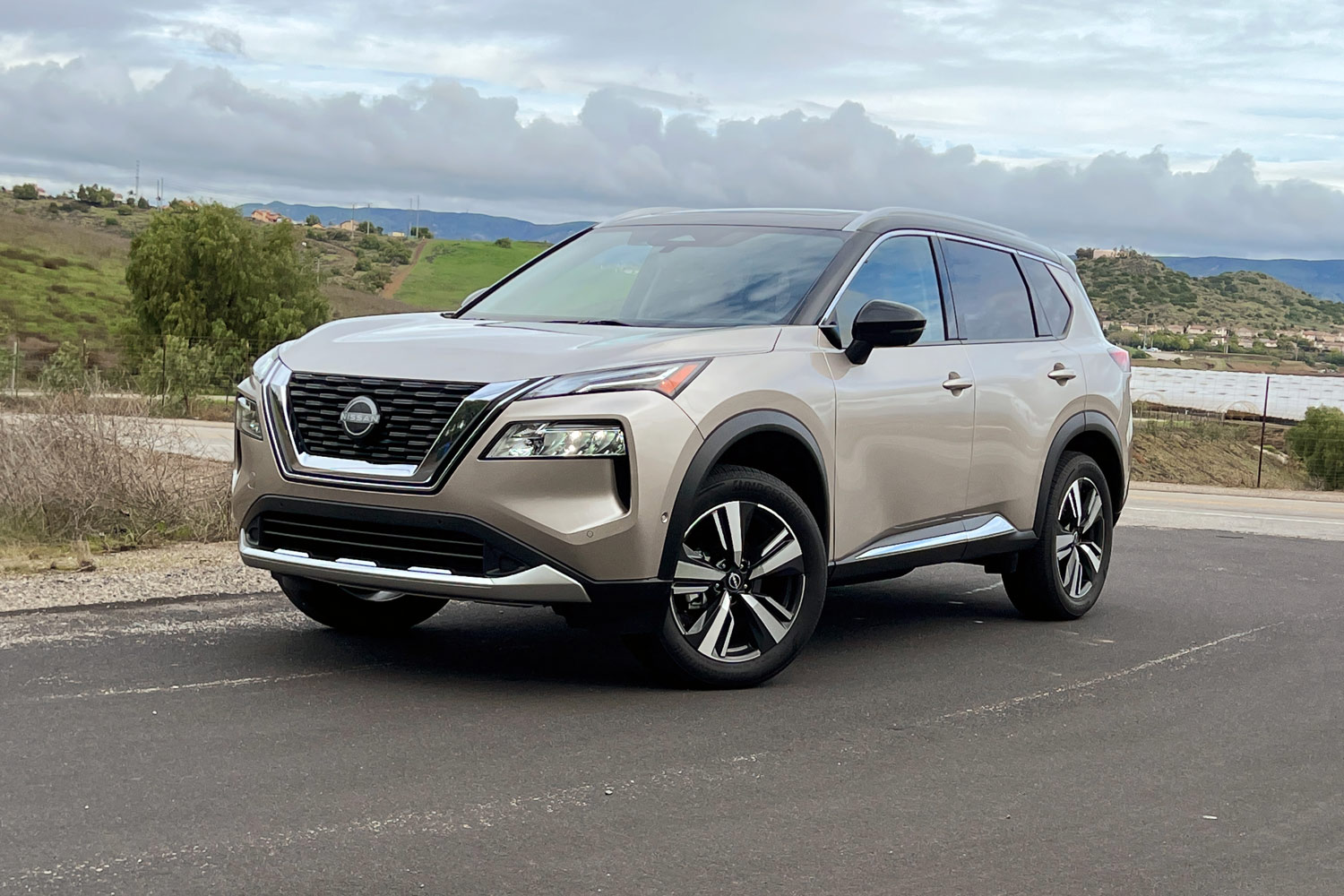 Christian Wardlaw
Christian Wardlaw
Nissan redesigned the Rogue compact crossover SUV a couple years ago, sticking to a combination that worked for the popular previous-generation model and making numerous modern enhancements. Among them were a more substantial appearance, improved interior quality, a roomier cabin, and next-generation technology.
Unfortunately, the 2021 Nissan Rogue did not offer significant changes under its hood, where a workhorse 2.5-liter four-cylinder engine provided class-average power through a continuously variable transmission. That didn't prevent the Rogue from retaining its position as one of the bestselling models in its class, but it dulled the SUV's redesigned shine.
Not long after the all-new Rogue arrived, Nissan replaced that engine with a turbocharged 1.5-liter three-cylinder power plant. You read that right, a whole cylinder and a liter of displacement less than the last generation. Thanks to turbocharging, however, the smaller engine makes more power, and there's even an increase in fuel economy. In addition, the new turbo three has Nissan's exclusive variable compression technology, which promises the power of a larger engine when you want it with the fuel efficiency of a smaller engine the rest of the time.
Does this new variable compression turbocharged engine, or VC-Turbo, transform the Rogue further? And has the automaker addressed my concerns following my review of the 2021 Nissan Rogue? I decided to test-drive the SUV again to find out.
The 2023 Nissan Rogue comes in S, SV, Midnight Edition, SL, and Platinum trim levels, and starting prices range from the high $20,000s to the high $30,000s, including the destination charge to ship the SUV from the Smyrna, Tenn., factory that builds it to your local dealership.
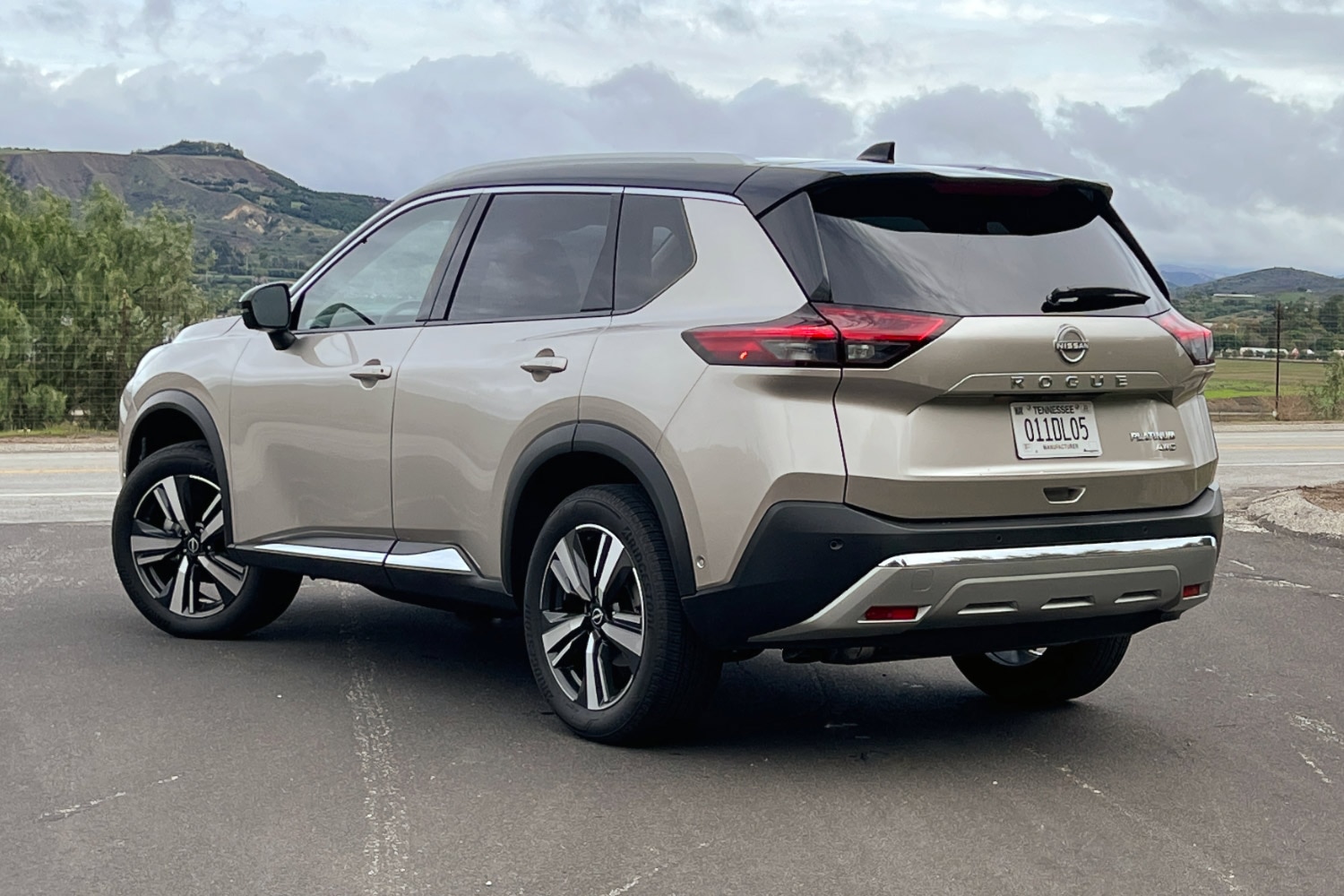 Christian Wardlaw
Christian Wardlaw
For this Rogue review, I test-drove a Platinum model in Southern California. It came with all-wheel drive, two-tone paint, a Premium package installing triple-zone automatic climate control, heated rear seats, and a head-up display. In addition, Nissan added numerous accessories to the test vehicle, including floor mats, additional lighting inside and out, a frameless rearview mirror, cargo area protection, and a first-aid kit.
These extras brought the manufacturer's suggested retail price to $43,100, including the $1,295 destination charge. Nissan provided the vehicle for this Rogue review.
2023 Nissan Rogue Review: The Design
The only design change that Nissan has made to the Rogue since 2021 is the addition of a Midnight Edition based on the SV trim level. It debuts for the 2023 model year.
The Midnight Edition treatment adds a blacked-out exterior appearance to the 2023 Nissan Rogue. In addition to the style changes, this new model also adds more standard equipment, including artificial leather upholstery, heated front seats, a heated steering wheel, an oversized sunroof, sun shades for the rear side windows, and a power rear liftgate. With its trendy appearance and attractive price, the new Rogue Midnight Edition should prove popular.
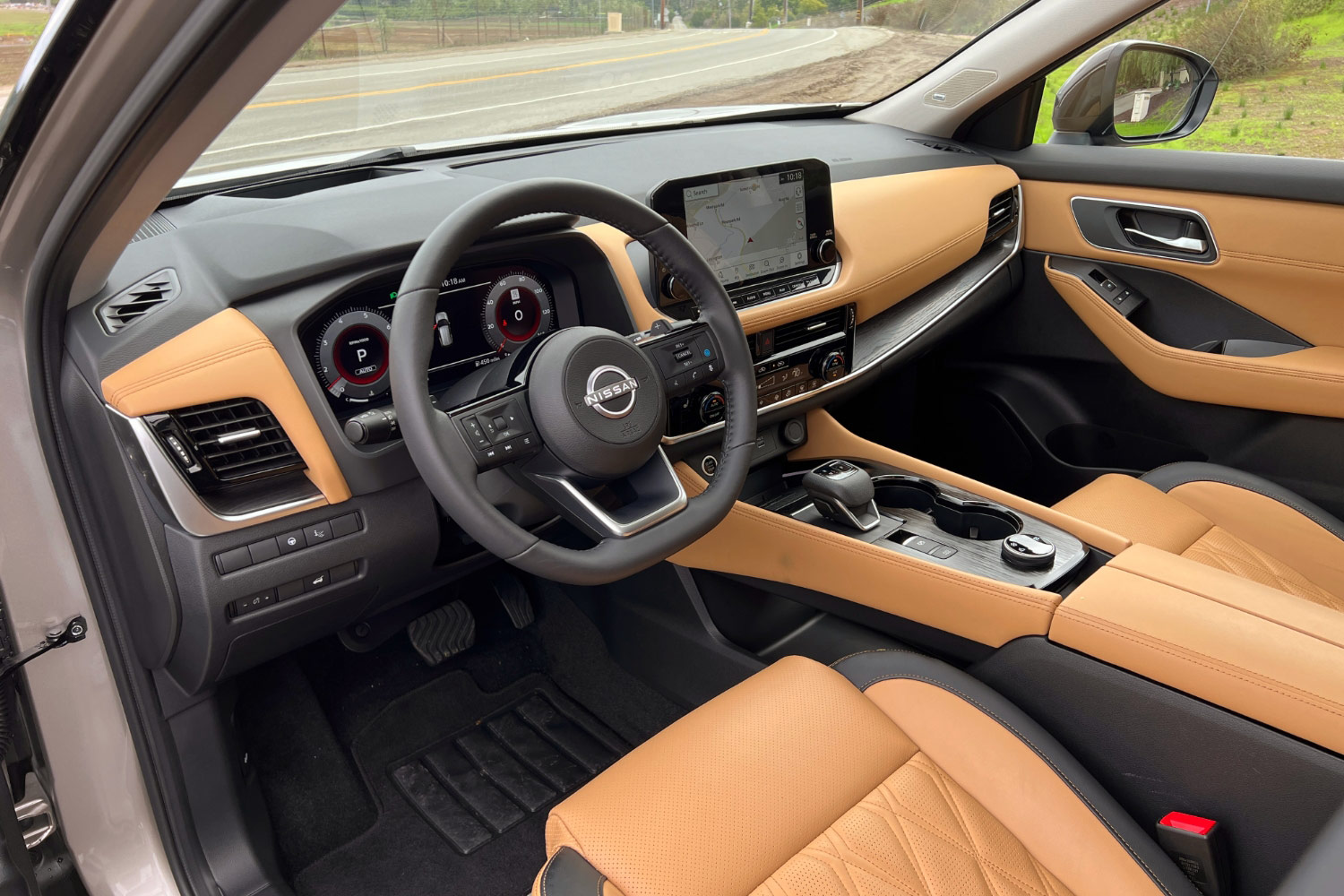 Christian Wardlaw
Christian Wardlaw
My test vehicle had Platinum trim, which allows Nissan to showcase all of the upscale features and technology it offers on the 2023 Rogue. Platinum trim includes premium leather with a quilted pattern, and it is soft, smooth, and supple, the kind of upholstery you find in luxury vehicles. In addition, the tan color in the test vehicle, which extends beyond the seats to include portions of the door panels, dashboard, and center console, stood in sharp contrast to the otherwise black interior and looked undeniably upscale.
Nissan logically arranges the Rogue's controls, and it is easy to acclimate to the electronic transmission shifter. You'll find stereo volume and tuning knobs, physical controls for the climate system, and clear labeling on the switchgear. However, the Rogue's key fob is an exception to this rule. The icons on the fob are the same color as the fob itself, making them very hard to read and almost impossible to discern in low-light conditions.
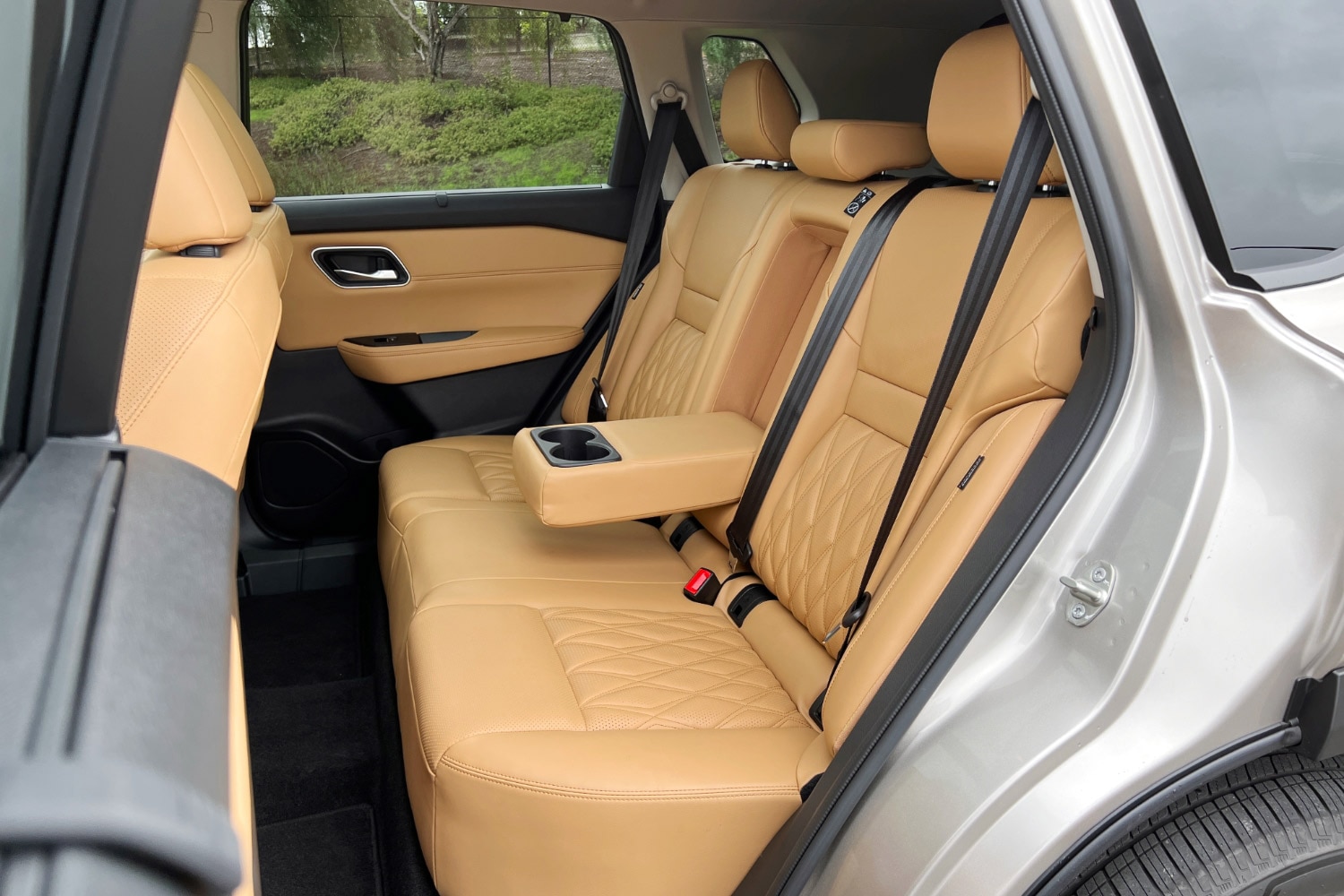 Christian Wardlaw
Christian Wardlaw
The Rogue features Zero Gravity front seat designs inspired by the weightlessness astronauts experience in space. The idea is to mimic the neutral spinal posture of a gravity-free environment to reduce fatigue. Nissan has used this approach for years now, to varying levels of success. In the 2023 Rogue, the front seats are exceptionally comfortable. However, while heated front seats and a heated steering wheel are available, the Rogue doesn't offer a ventilated front seat option.
My Rogue Platinum test vehicle had the optional Premium package. It equips the SUV with a triple-zone automatic climate control system with rear-seat controls and heated rear seats. Those features enhance comfort, and there is plenty of room in the back seat for adult passengers. Unfortunately, the rear seat itself is not a good place to spend hours at a time. It is flat and lacking in support, and the Platinum's diamond-pleated leather feels like air bubble packaging on your back.
Most likely, the rear seat has these characteristics because Nissan wants it to fold down as flat as possible to expand cargo capacity from 36.5 to 74.1 cu-ft. But I'd prefer a more comfortable seating experience.
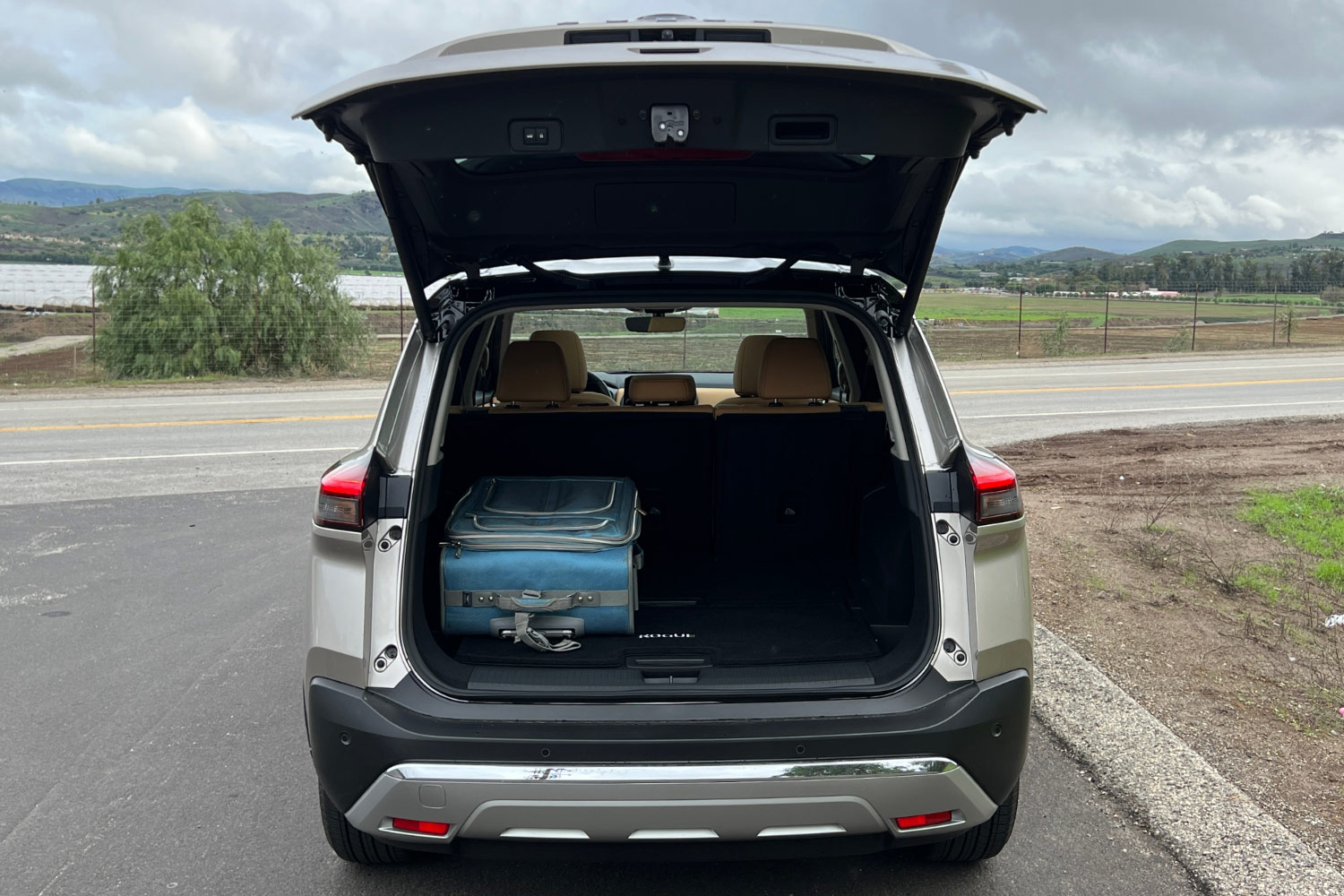 Christian Wardlaw
Christian Wardlaw
As for storage, the cargo hold features Nissan's Divide-N-Hide storage system, which you can configure six ways. In the cabin, Nissan offers numerous bins, trays, and cubbies into which you can stash your stuff. Unfortunately, most are unlined, so items placed there can potentially create added noise, vibration, and harshness while driving.
2023 Nissan Rogue Review: The Technology
Nissan is preparing to roll out a new infotainment system in its vehicles. The first one to get the new 12.3-inch touchscreen is the refreshed 2023 Altima, and based on my experience using this excellent new version of NissanConnect, it needs to go into the Rogue as soon as possible.
For now, the Rogue continues to use the same system that failed to impress me back in 2021. And the same problems exist, from a clunky interface to a voice recognition system that seems unable to recognize my voice.
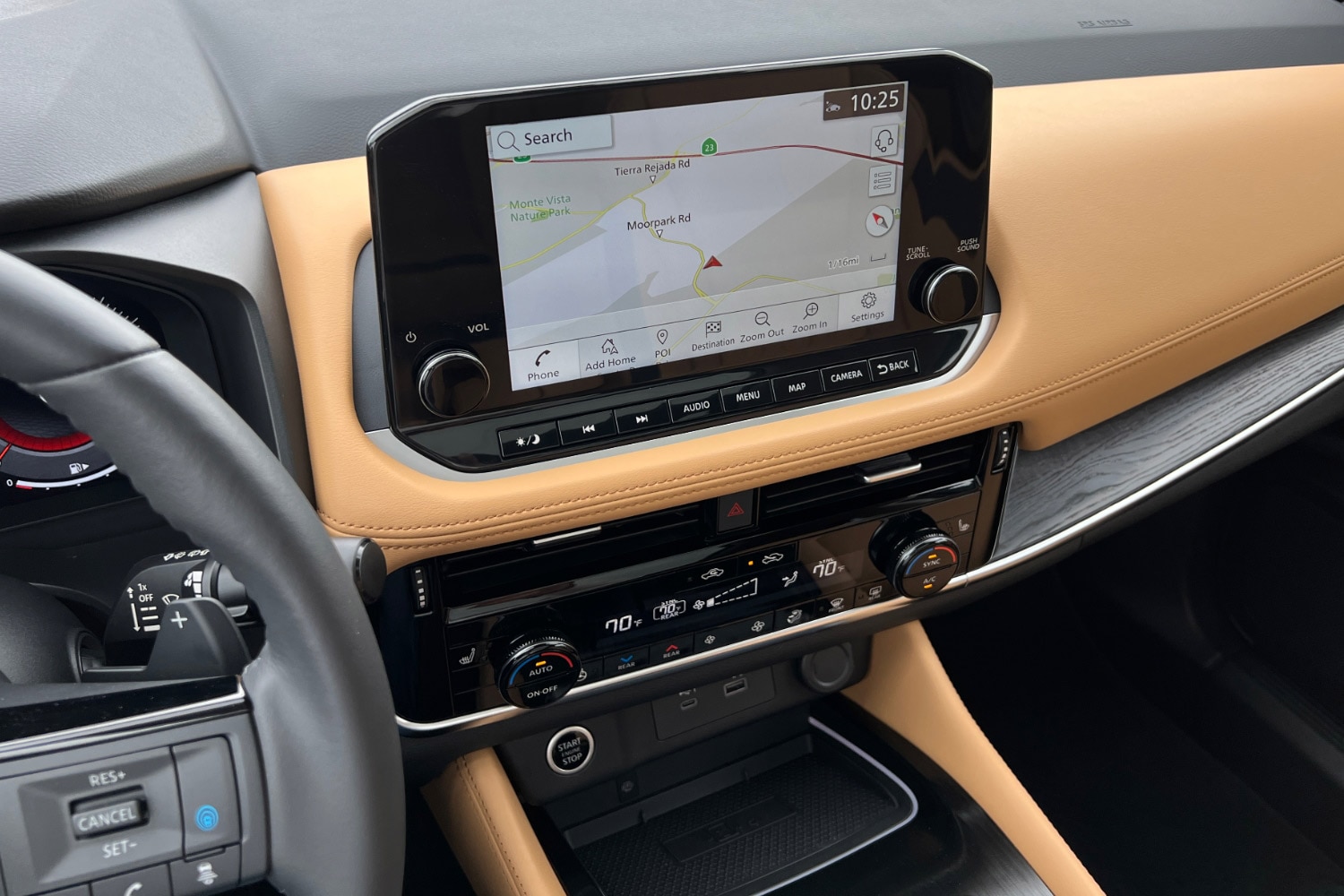 Christian Wardlaw
Christian Wardlaw
All Rogues have a standard 8.0-inch touchscreen infotainment system except for the Platinum, which comes with a 9.0-inch touchscreen paired with a 12.3-inch digital instrumentation display. Both systems include Bluetooth, Apple CarPlay, Android Auto, text-messaging support, and SiriusXM satellite radio.
The 9.0-inch system is available in the Rogue SL and standard in the Rogue Platinum. It adds a wireless version of Apple CarPlay, NissanConnect connected services with complimentary trial subscriptions, and a navigation system with a door-to-door function that continues providing directions via a smartphone app when you're on foot. The upgraded system pairs with a Bose premium sound system, and for 2023, Nissan adds a new Alexa Built-in digital assistant.
Since the Platinum test vehicle's native voice recognition system proved nearly useless, I can only conclude that Alexa Built-in wasn't active. I've used this technology in other models, and it is excellent. In addition, it proved flawlessly capable in the 2023 Nissan Altima sedan. But besides helping me find a Starbucks, the Rogue's voice recognition technology was unable to understand or adequately respond to my usual list of testing commands.
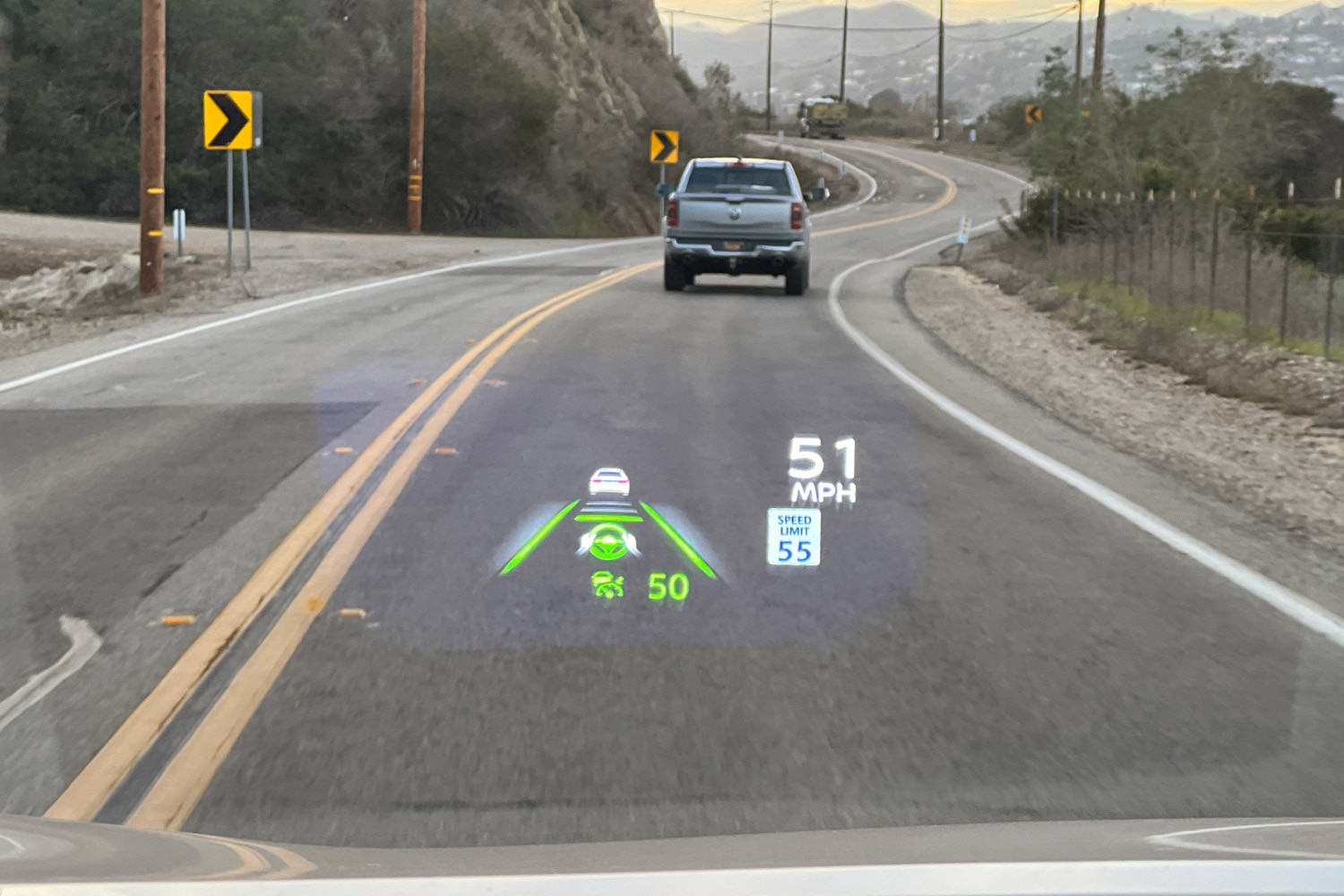 Christian Wardlaw
Christian Wardlaw
Thanks to the Platinum Premium option package, the test vehicle had a head-up display. It shows numerous data points and is helpful, especially concerning ProPilot Assist activity.
ProPilot Assist is one of the Rogue's available driver assistance and collision avoidance systems. Standard beginning with SV trim, it builds on the standard Nissan Safety Shield 360 collection of safety features with adaptive cruise control, lane-keeping assist, and lane-centering assist to help keep the Rogue centered in the lane of travel and following traffic ahead at a safe distance. ProPilot Assist adds automatic slowing for curves and freeway interchange ramps when the Rogue has a navigation system. It requires drivers to keep their hands on the steering wheel during use.
While testing the technology, ProPilot Assist worked well on the freeways in and around Los Angeles. The system issues audible alerts each time it acquires and loses a vehicle ahead, which can get tiresome, but the tech works with smoothness, refinement, and sophistication. In addition, when you make a lane change to pass slower vehicles, the Rogue accelerates back up to your pre-set speed without delay. The only criticisms here pertain to the slightly more abrupt braking than is necessary when another motorist cuts into the gap ahead of the Rogue and excessive slowing with the navigation-based Navi-link tech.
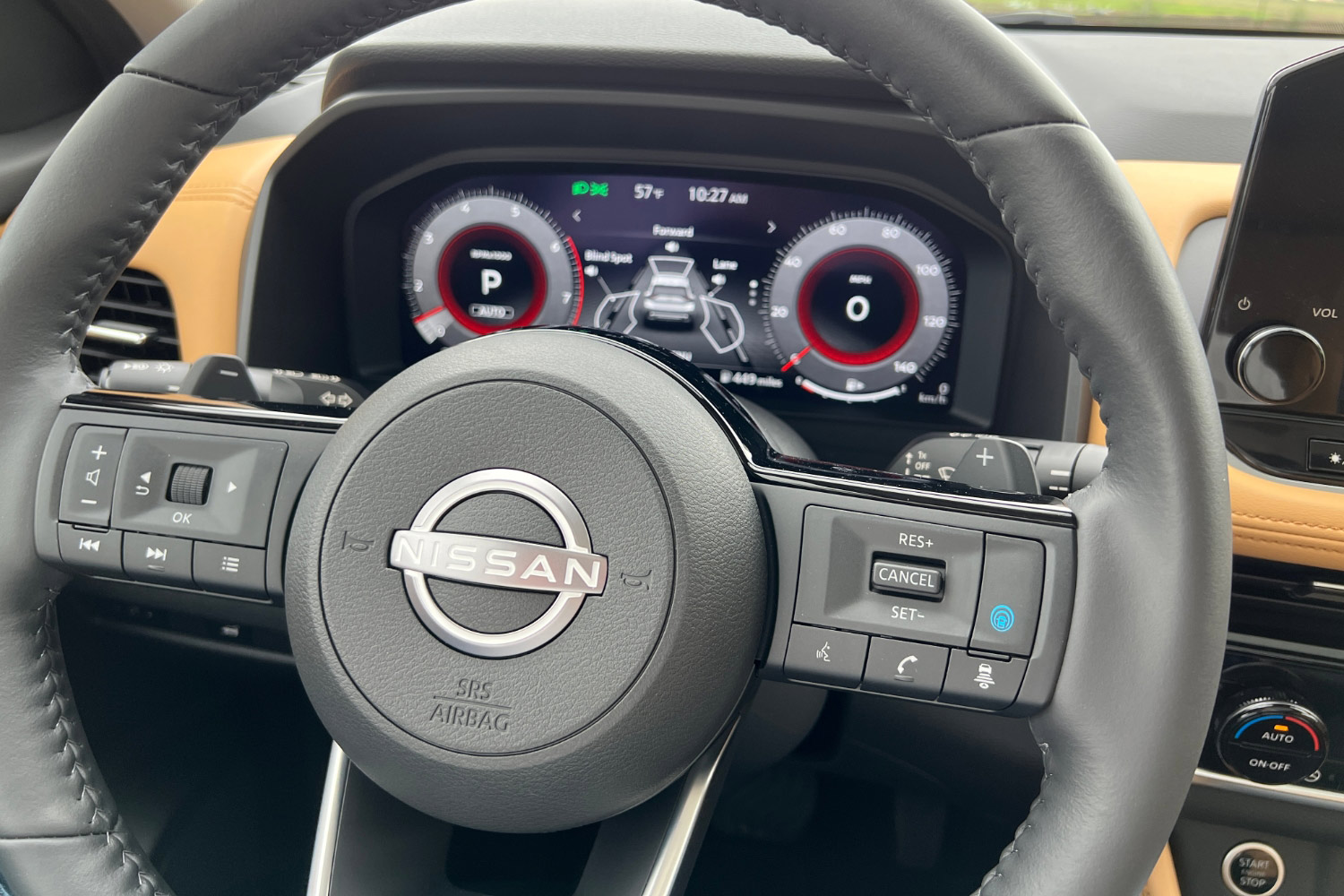 Christian Wardlaw
Christian Wardlaw
Additional safety-related upgrades for the 2023 Rogue include a driver monitoring system, a surround-view camera system, and an active blind-spot monitoring system. The latter feature can actively try to steer the Rogue back into the existing travel lane when the driver attempts an unsafe lane change. The subscription-based NissanConnect services also offer safety-related features such as automatic collision notification, emergency calling, and owner alerts related to vehicle speed, curfew time, and travel beyond geographic boundaries.
Regarding safety ratings, the Rogue received a 2023 Top Safety Pick designation from the Insurance Institute for Highway Safety (IIHS). It also gets a five-star overall crash-test rating from the National Highway Traffic Safety Administration (NHTSA).
Some concerns are brewing, however. In the IIHS testing, the SUV this year gets less impressive ratings in two updated frontal- and side-impact tests and misses the top score from the NHTSA for frontal-impact protection.
2023 Nissan Rogue Review: The Drive
The most significant change to the current-generation Rogue since it went on sale in 2021 is under the hood. For the 2022 model year, Nissan swapped in a new 1.5-liter three-cylinder VC-Turbo engine that is smaller, more powerful, and more efficient than the previous 2.5-liter four-cylinder engine. Plus, it uses the new automatic continuously variable transmission that Nissan has been building and improving for 20 years.
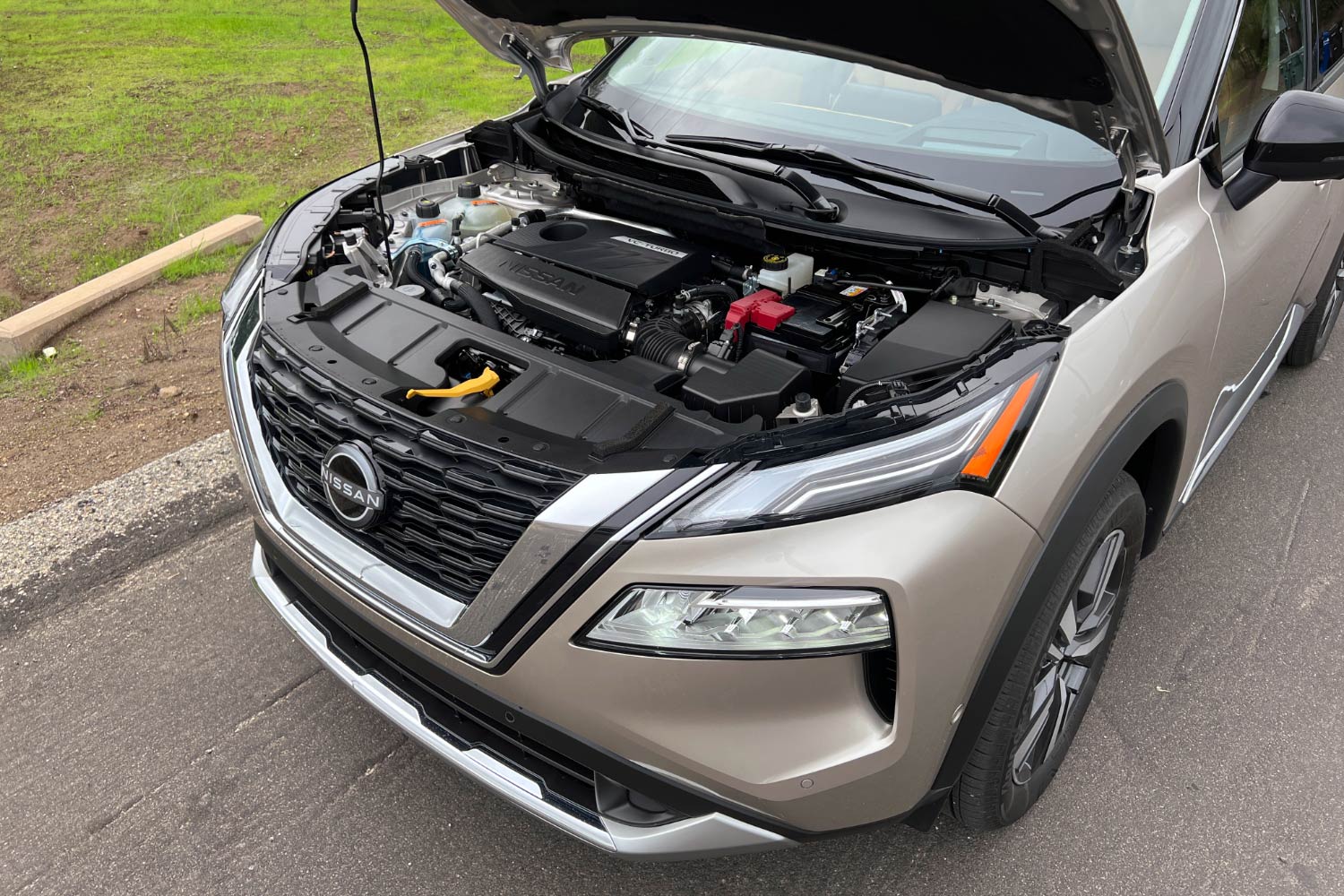 Christian Wardlaw
Christian Wardlaw
Nissan rates the engine to deliver 201 horsepower at 5,600 rpm and 225 lb-ft of torque between 2,800 rpm and 4,000 rpm, while official EPA fuel economy ratings range from 31 mpg to 33 mpg in combined driving for all-wheel drive and front-wheel-drive models, respectively. These figures represent gains of 20 hp, 44 lb-ft, and three mpg over the old 2.5-liter four-cylinder.
The VC-Turbo engine makes driving the Rogue more enjoyable. The added power and broader surge of torque at lower engine revs produce livelier acceleration, and I averaged 28.9 mpg on my evaluation route, an improvement of two mpg over my result in the 2021 Rogue. In addition, aside from occasionally dramatic upshifts, the new transmission rarely draws attention to itself.
If there is anything unusual to note about the VC-Turbo engine, it is the sound and feel of the three-cylinder when accelerating. When revved, the engine sounds sportier and more aggressive, a welcome change from the wheezing of a typical four-cylinder engine. However, it also introduces a shimmy and vibration that the driver feels through the accelerator pedal. So while it sounds better, it doesn't feel as smooth.
Despite the standard inclusion of two brake-based technologies designed to enhance the Rogue's ride and handling, this SUV suffers from excessive lateral and vertical body movement when driving on uneven or undulating pavement. As a result, it rocks, bobs, and floats more than is preferable.
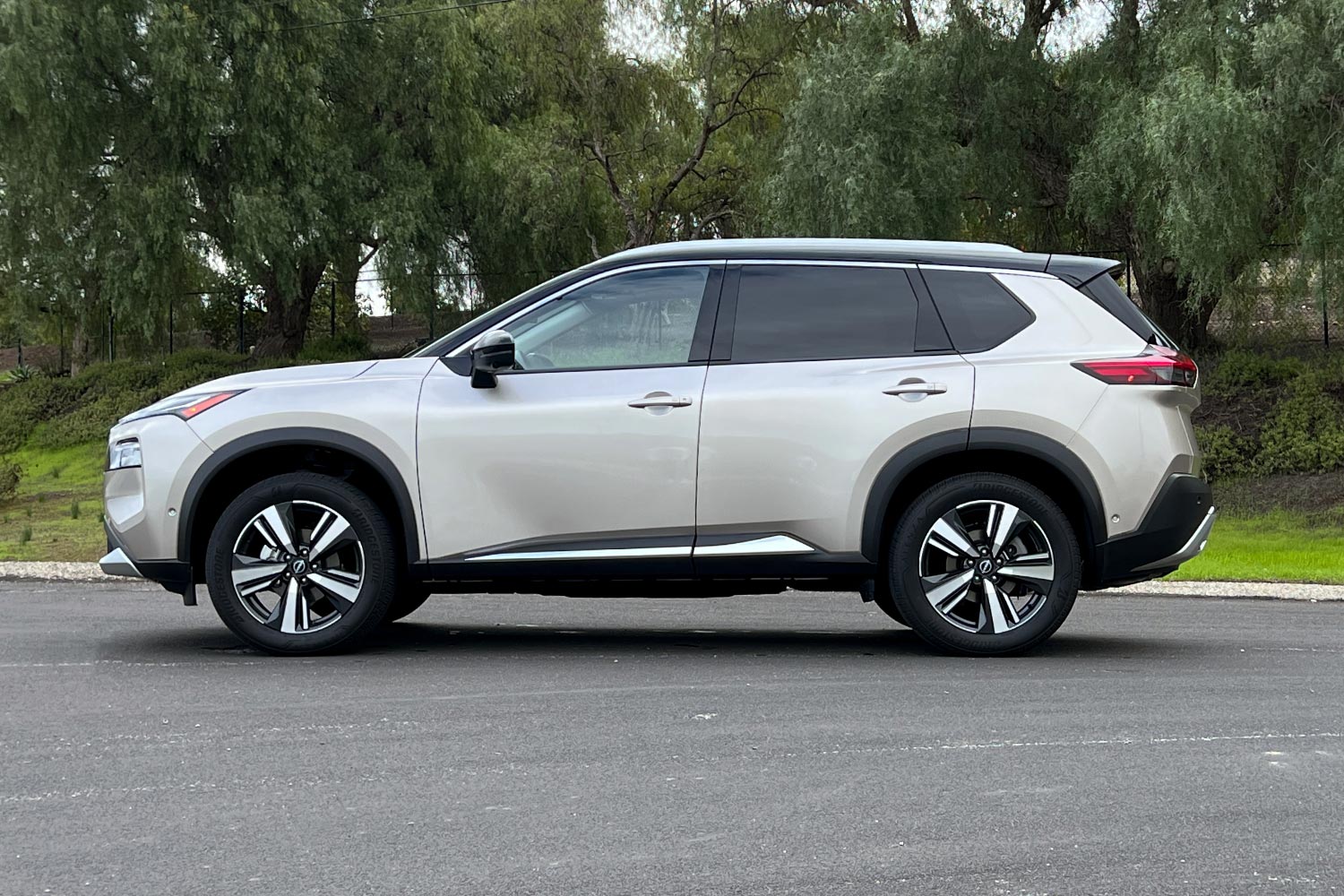 Christian Wardlaw
Christian Wardlaw
Nevertheless, the Rogue's Active Ride Control allows the Rogue to travel smoothly over speed bumps and speed humps. In addition, the Active Trace Control employs brake-induced torque vectoring to help tighten cornering lines in curves, contributing to the Rogue's predictable handling character. Based on my experience driving the Rogue Platinum, these two features function as intended.
Unfortunately, the Rogue's steering feels lifeless in the driver's hands, and the P235/55R-19 all-season tires give up their grip early. So, don't let the transmission paddle shifters and available Sport driving mode fool you: This SUV is at its best when you use it as a commuter vehicle, a school shuttle, and a grocery getter.
Is the 2023 Nissan Rogue a Good SUV?
With the 2023 Rogue, Nissan competes in one of the most popular vehicle segments in the U.S. There is no shortage of alternatives, which means it is best to stand out somehow if you want to retain your existing customers while attracting new ones. Within this context, the Rogue strikes me as a fundamentally good SUV. However, fully loaded it's on the more expensive end of the segment and electrified powertrains are nowhere in sight.
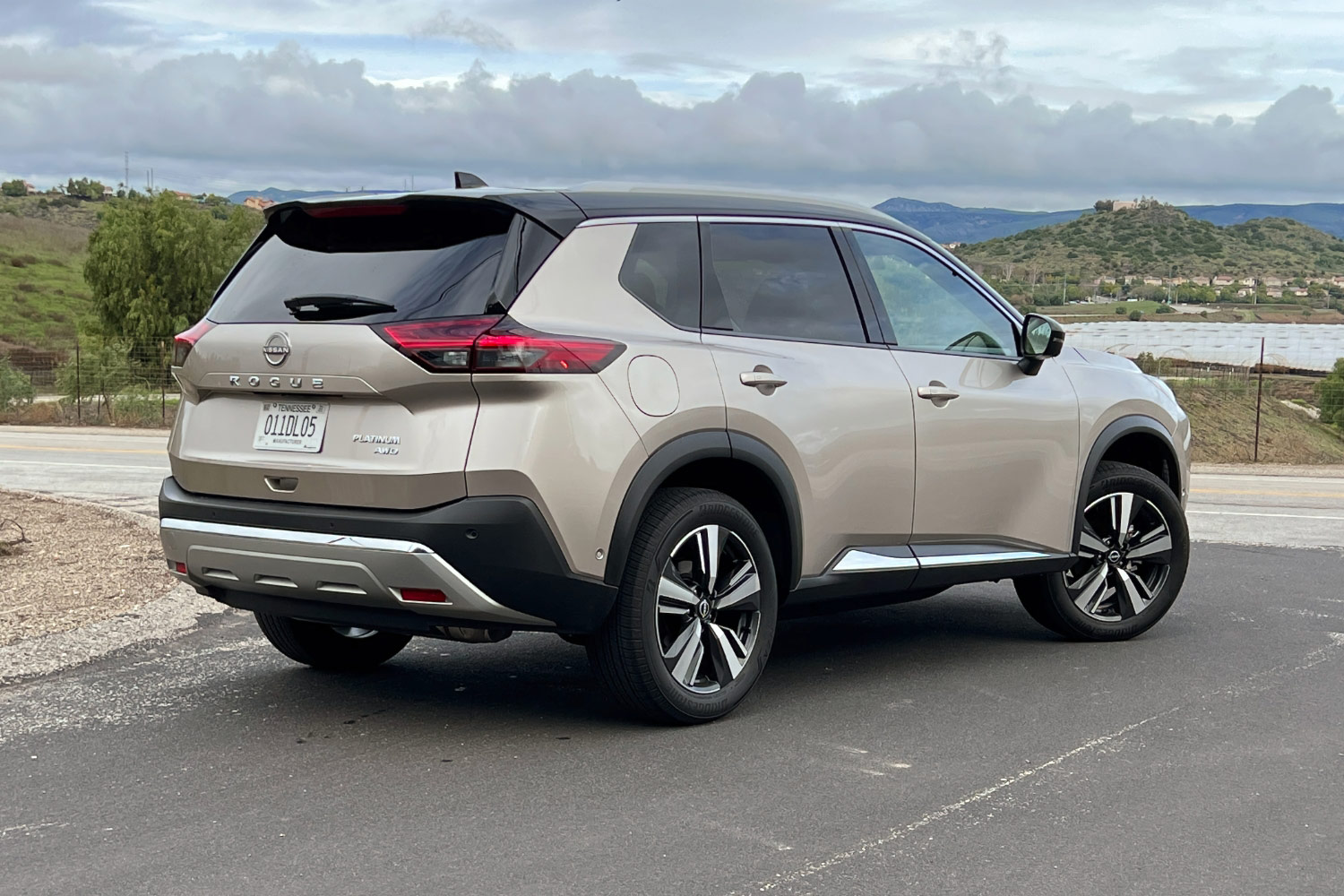 Christian Wardlaw
Christian Wardlaw
My test vehicle's $43,100 sticker price was shocking, considering the lack of even a partial hybrid system. At a time when many of Nissan's primary competitors are focused on expanding access to electrified drivetrains, the Rogue offers only a turbocharged gas engine. That means buyers seeking hybrid and plug-in hybrid models must shop models such as the Ford Escape, Honda CR-V, Hyundai Tucson, Kia Sportage, Mitsubishi Outlander, and Toyota RAV4.
In addition, many of the Rogue's competitors offer a longer warranty, more generous free trials to connected services, or complimentary scheduled maintenance. Some supply all three.
For every one of the Rogue's favorable characteristics, it seems like there is a head-scratcher to ponder. This vehicle lacks cohesion, reflected in the inconsistencies between the front and rear seat comfort, the ride and handling qualities in varying situations, and thoughtful details contrasted with thoughtless oversights.
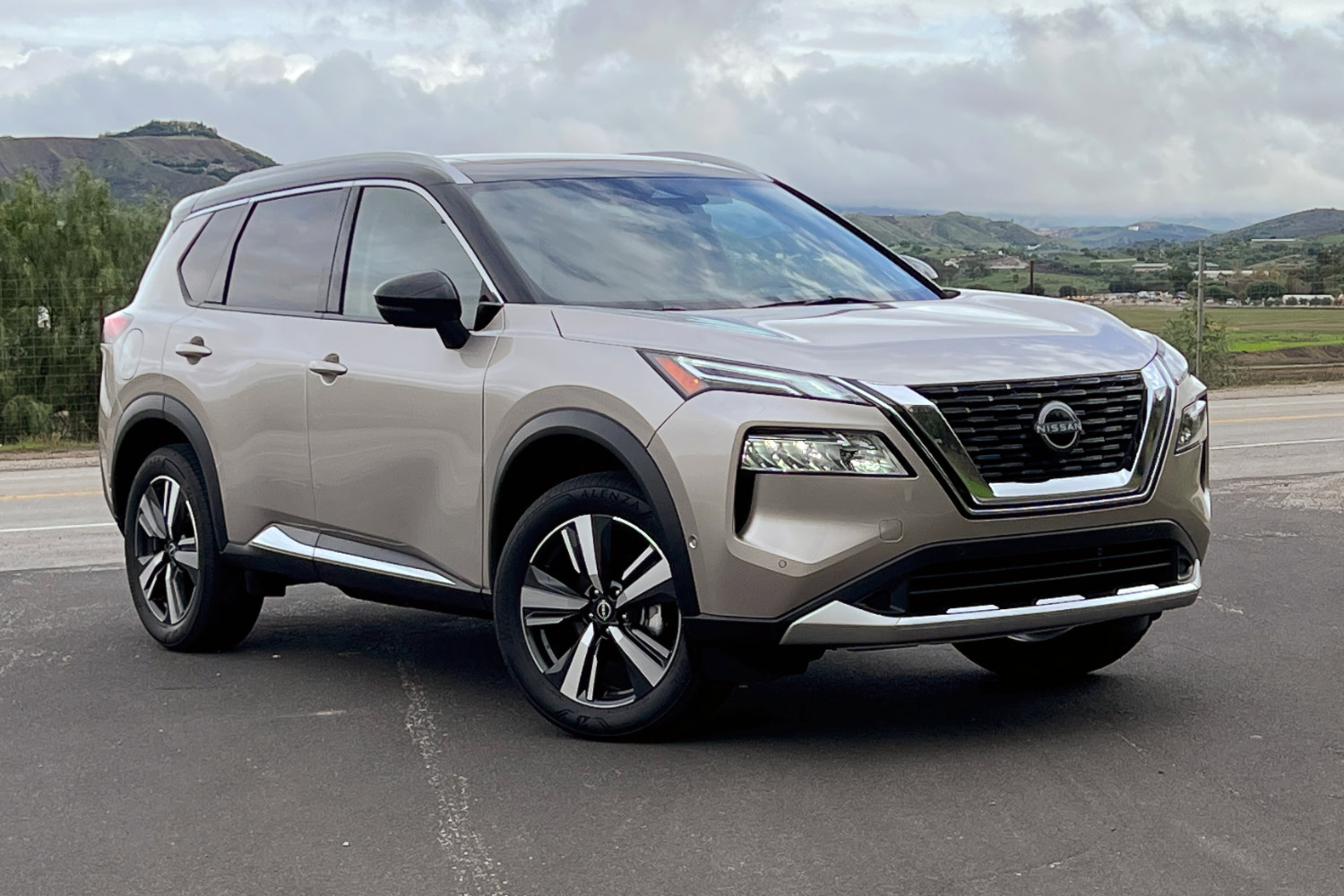 Christian Wardlaw
Christian Wardlaw
It's not hard to understand why the Rogue is Nissan's most popular model. It is stylish, genuinely likable, and generally competitive. But the company will need to keep the Rogue on a program of continuous improvement if it wants its compact crossover to remain that way. The competition in the segment is relentless.
Written by humans.
Edited by humans.
 Christian Wardlaw
Christian WardlawChris says his first word was "car." For as long as he can remember, he's been obsessed with them. The design. The engineering. The performance. And the purpose. He is a car enthusiast who loves to drive, but is most passionate about the cars, trucks, and SUVs that people actually buy. He began his career as the editor-in-chief of Edmunds.com in the 1990s, and for more than 30 years has created automotive content for CarGurus, J.D. Power, Kelley Blue Book, the New York Daily News, and others. Chris owns Speedy Daddy Media, has been contributing to Capital One Auto Navigator since 2019, and lives in California with his wife, kids, dog, and 2004 Mazdaspeed Miata.
Related articles
View more related articles